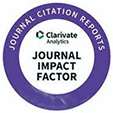EXTRACTION OF COPPER ELECTROLYTICALLY BY USING SOLID MIXTURE OF CuFeS2 AND CaCO3 (CHALCOPYCA) AS ANODE
Agus Kuncaka(1*), Eko Sugiharto(2), Yasinta Endah Nastiti(3)
(1) Chemistry Department, Faculty of Mathematics and Natural Sciences Gadjah Mada University, Yogyakarta 55281
(2) Chemistry Department, Faculty of Mathematics and Natural Sciences Gadjah Mada University, Yogyakarta 55281
(3) Chemistry Department, Faculty of Mathematics and Natural Sciences Gadjah Mada University, Yogyakarta 55281
(*) Corresponding Author
Abstract
Study on a new road of copper electroextraction to make use the solid mixture of CuFeS2 and CaCO3 as anode has been done. The aim of these research was to determine reaction kinetic and faradic efficiency of anodic copper dissolution and catodic copper precipitation. A solid mixture of CuFeS2 and CaCO3 at weight ratio 9:1 was functioned as anode. Electrolysis was carried out at 1.5 mA by varying times of 30,60,120, and 240 minutes in Na2SO4 0.5 M + H2SO4 0.01 M electrolyte. The quantity of copper at the electrolyte and cathode was analyzed by Atomic Absorption Spectrophotometer (AAS). The result of these research showed that copper was deposited in the cathode simultaneously with anodic dissolution. The kinetic of copper dissolution follow zero order with rate constant of 5.10-6 mg/second. The faradic efficiency of copper dissolution and precipitation for those various time respectively were 17.31%; 14.00%; 11,16%; 62.31%; and 1.60%; 8.61%; 7.59%; 60.63%.
Keywords
Full Text:
Full Text PDFReferences
[1] Oxtoby, D.W., Gillis, H.P., dan Norman, H., 1999, Principles of Modern Chemistry, edisi 4, Harcourt Inc, New York.
[2] Kuncaka, A., Rusdiarso B. dan Basuki K.T., 1997, Kombinasi Elektro-ekstraksi Untuk Penyediaan Emas, Perak, dan Tembaga Kualitas Fungsi Tinggi dari Konsentrat Tembaga, Laporan RUT IV, Yogyakarta.
[3] Crundwell, F.K., 1998, J. Hidrometallurgy, 29, 417-460.
[4] Kuncaka A, 2002, Prospek Pengambilan Tembaga Dari Konsentrat Tembaga Secara Elektrometalurgi Sebagai Proses Pengolahan Konsentrat Tembaga Bebas Emisi Gas SO2, Prosiding Seminar Jaringan Kerjasama Kimia Indonesia, Yogyakarta.
[5] Ammou-Chokroum, M., P.K., Sen, dan F. Fouques, 1981, Electroxidation of Chalcopyrite in Acid Chloride Medium : Kinetics, Stoichiometry and Reaction Mechanism. Dalam Lawskowski, J., Developments in Mineral Processing, vol. 2, edisi A, Polish Scientific Publisher, Warsawa.
[6] Tshilombo, A.F., J. Petersen, dan D.G. Dixon, 2000, The Influence of Applied Potentials and Temperature on The Electrochemical Response of Chalcopyrite During Bacterial Leaching, University of Columbia, Toronto.
Article Metrics
Copyright (c) 2010 Indonesian Journal of Chemistry

This work is licensed under a Creative Commons Attribution-NonCommercial-NoDerivatives 4.0 International License.
Indonesian Journal of Chemistry (ISSN 1411-9420 /e-ISSN 2460-1578) - Chemistry Department, Universitas Gadjah Mada, Indonesia.











